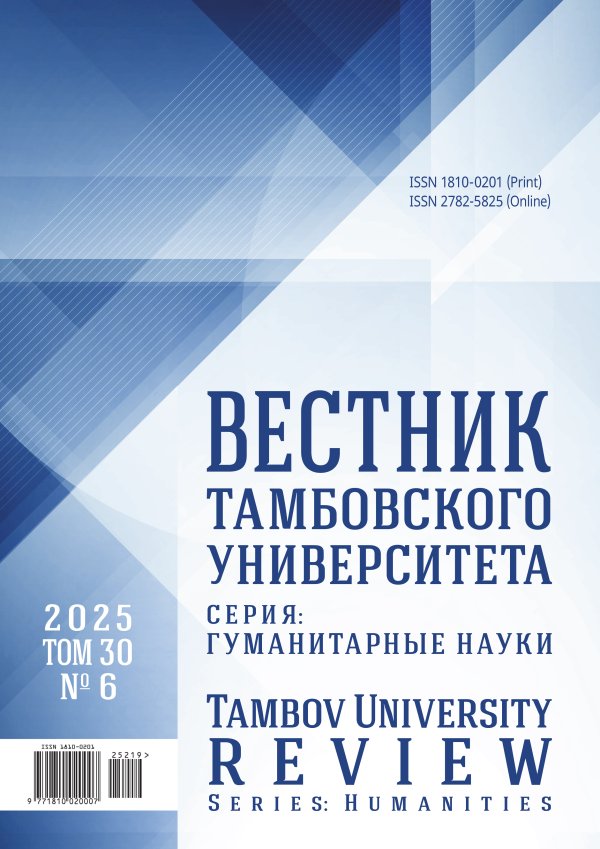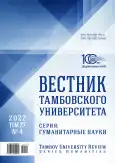Обращения к Богу в документах правоохранительной системы России (с древнейших времен до 1917 г.)
- Авторы: Петрыкин Н.Н.1
-
Учреждения:
- ФГКОУ ВО «Белгородский юридический институт Министерства внутренних дел Российской Федерации им. И.Д. Путилина»
- Выпуск: Том 27, № 4 (2022)
- Страницы: 1028-1036
- Раздел: ОТЕЧЕСТВЕННАЯ ИСТОРИЯ
- URL: https://journal-vniispk.ru/1810-0201/article/view/298277
- DOI: https://doi.org/10.20310/1810-0201-2022-27-4-1028-1036
- ID: 298277
Цитировать
Полный текст
Аннотация
Рассмотрены документы отечественной правоохранительной системы со времен Киевской Руси до 1917 г. на предмет обращения к Богу – источнику неизменяемых нравственных ценностей с позиции православной религиозной традиции. Изучение данной темы имеет особое значение для понимания российской истории с учетом того фактора, какое место занимало православие в жизни государства и отдельной личности. Отмечено, что истоки правоохранительной сферы России совпадают с зарождением христианства и государственности на Руси. На основе хрестоматии, вышедшей в свет к 300-летию российской полиции, и через изучение документов с X по XIX век исследуется характер таких обращений, проведен их сравнительный анализ. Выделены три периода: первый – от первого договора Руси с греками до введения должности Санкт-Петербургского генерал-полицмейстера; второй – от введения должности Санкт-Петербургского генерал-полицмейстера до учреждения Министерства внутренних дел; третий – от учреждения Министерства внутренних дел до расформирования Корпуса жандармов в 1917 г. В документах каждого из периодов проанализированы формы и контекст обращений к Богу, что позволило выявить тенденцию происходивших в обществе изменений по отношению к высшей для православного вероисповедания ценности – Триединому Богу. Сделан вывод о периоде сохранения традиционных для православного вероисповедания понятий о Боге в документах правоохранительной системы России, а также времени начала утраты таких понятий. Выдвинута гипотеза о возможности возрождения высших традиционных религиозных ценностей в России на современном этапе.
Ключевые слова
Об авторах
Н. Н. Петрыкин
ФГКОУ ВО «Белгородский юридический институт Министерства внутренних дел Российской Федерации им. И.Д. Путилина»
Автор, ответственный за переписку.
Email: npetrykin@mvd.ru
ORCID iD: 0000-0003-1441-6974
кандидат исторических наук, преподаватель кафедры обеспечения безопасности на объектах транспорта
308024, Российская Федерация, г. Белгород, ул. Горького, 71Список литературы
- История правоохранительной системы России в документах: с древнейших времен до 1917 года (к 300-летию российской полиции): в 2 т. / под ред. В.Л. Кубышко. Т. 1. (X в. – 1802 г.). М., 2018. 392 с.
- История правоохранительной системы России в документах: с древнейших времен до 1917 года (к 300-летию российской полиции): в 2 т. / под ред. В.Л. Кубышко. Т. 2. (1802–1917 гг.). М., 2018. 440 с.
- Дудин Н.П. Становление и развитие правоохранительной системы Российской Федерации // Общество и право. 2016. № 2 (56). С. 289-294.
- Тарасов И.Т. Очерк науки полицейского права. М.: Печатня О.П. Яковлева, 1897. 702 с.
- Аксаков К.С. Государство и народ / под ред. О.А. Платонова. М.: Ин-т русской цивилизации, 2009. 608 с.
- Осавелюк А.М. Бог в Конституции России: новые смыслы и акценты (о некоторых изменениях в Конституции РФ, одобренных в ходе общероссийского голосования 1 июля 2020 г.) // Государство и право. 2020. № 12. С. 57-65. https://doi.org/10.31857/S102694520012732-6
- Карсавин Л.П. Об опасностях и преодолении отвлеченного христианства // Путь. 1927. № 6. С. 32-49.
- Петрыкин Н.Н. Жандармская железнодорожная полиция: опыт осуществления массовых перевозок на территории Курской губернии (1896–1914) // Вестник Тамбовского университета. Серия: Гуманитарные науки. 2020. Т. 25. № 187. С. 110-119. https://doi.org/10.20310/1810-0201-2020-25-187-110-119
- Флоровский Г.В. Пути русского богословия / под ред. О.А. Платонова. М.: Ин-т русской цивилизации, 2009. 848 с.
Дополнительные файлы









